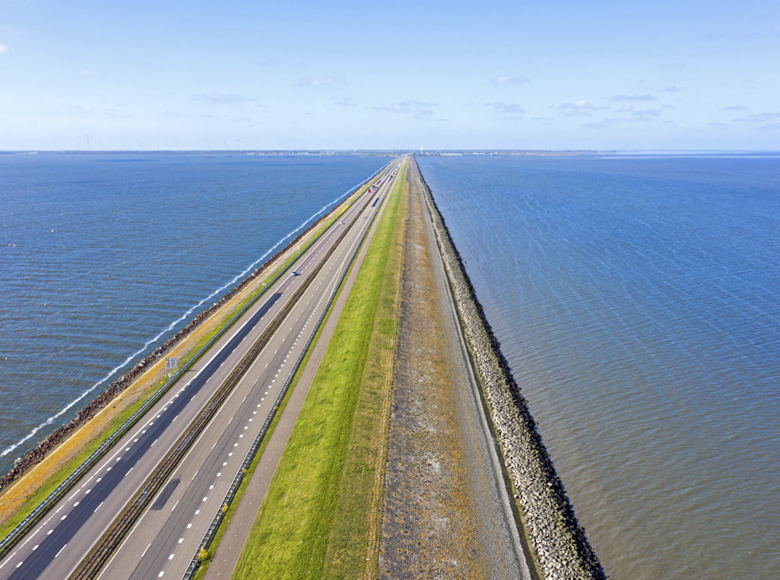Transactions: EMEA
Protecting the Netherlands from storm surge

The Netherlands, one-third of which famously sits below sea level, has long been known for its extensive experience in managing its vulnerability to water. The 32-kilometre Afsluitdijk is a feat of Dutch engineering that has protected the country against storm surge and sea level rise for almost 90 years. But climate change – and the dyke’s age – meant that the Afsluitdijk would have to be reinforced in order to ensure that it could continue to withstand any combination of severe weather, high water levels and crashing waves.
In 2018, the Dutch Ministry of Infrastructure and Water Management (Rijkswaterstaat) embarked on a multi-year infrastructure project to renovate the iconic causeway. Key elements of the renovation include raising the height of the dyke, reinforcing its outer wall with specially designed concrete blocks to protect against waves and adding two solar-powered pumping stations to drain water out of Lake Ijssel when natural drainage is not possible. In addition, the Afsluitdijk will serve as a test centre for renewable tidal energy where water emptied from Lake Ijssel meets the Wadden Sea.
To design, build and finance the refurbishment efforts, the Levvel Consortium was selected as the Design, Build, Finance, Maintenance (DBFM) contractor, with Swiss Re Corporate Solutions as the lead provider of professional indemnity cover to Levvel as well as the co-lead insurer for the Constractors’ All Risks Insurance.
Swiss Re’s involvement in an infrastructure project of such scale reinforces our ambition to mitigate climate risk while advancing the energy transition. And as an integral component of the Dutch government’s long-term Delta Programme – which aims to protect the low-lying country from flooding, mitigate the impact of extreme weather events and secure freshwater supplies – the Afsluitdijk renovation will contribute to making the Netherlands and its economy more resilient to climate-related risks for years to come.
elipsLife: closing the life protection gap in Italy

In February and March 2020, Italy found itself at the epicentre of the COVID-19 pandemic as hospitalisations and the tragic death toll in its northern provinces rose. It was the first European country to go into lockdown while the world was still struggling to comprehend the severity of the disease. This prompted many individuals to wonder how their families would cope financially should the worst happen.
In Italy, the protection gap for uninsured families in the case of the death or disability of the primary breadwinner amounts to an estimated EUR 8.2 billion. When 4.5 million Italians emerged from lockdown to return to work, there was greater awareness among employees and employers about the importance of life and health protection. Small and mid-sized employers sought to provide life coverage for their low-income employees. In response, elipsLife – a wholly-owned subsidiary of Swiss Re specialised in group life and disability products for pension funds, companies and foundations – adapted a product in Italy to make it affordable for low-income employees who rarely have access to group life coverage. Launched in April, the solution provides broad coverage, including for COVID-related deaths, and is flexible, easy to understand and simple for employers to implement. Premiums start at as little as EUR 13.50 annually, with the option to double the insured benefit for covered individuals with mortgages or minor children.
Initially distributed in the spring by a leading regional insurance broker, elipsLife’s risk insurance solution quickly gained recognition in the Italian market as an innovative product that provides peace of mind to an underserved segment of the population. elipsLife has since partnered with 17 additional brokers to distribute this risk insurance solution to 6 000 Italian employees in 2020. As an expert in employee benefits, elipsLife and Swiss Re remain committed to reducing the protection gap in Italy while strengthening the financial resilience of families.
Promoting greener shipping technologies with marine insurance

The shipping industry is responsible for transporting over 90% of international trade across our oceans. But it also accounted for almost 3% of global CO2 emissions in 2018, while the burning of bunker fuel used by ships is responsible for over 90% of all sulphur emissions. In response, the International Maritime Organization (IMO) introduced a sulphur emissions cap of 0.5%, which went into effect in January 2020. It has also set an industry-wide target to reduce the sector’s overall greenhouse gas emissions by 50% by 2050, relative to 2008 levels. As a result, shipping companies are under pressure to develop and deploy innovative technologies that reduce harmful pollutants.
One prime example is Baleària, Spain’s leading shipping company for passenger and freight transport between the Spanish mainland and the Balearic Islands, the Canary Islands and North Africa. In 2020, it unveiled its first fast ferry powered by liquefied natural gas (LNG). Swiss Re Global Marine provided reinsurance cover for the construction of this ship and continues to provide reinsurance cover for its hull. At 123 metres in length and with a capacity for 1 200 passengers and 450 cars, it is the world’s largest LNG-fuelled fast ferry. More importantly, it reduces CO2 emissions by 30%, nitrogen oxide by 85% and sulphur by almost 100% compared to the heavy fuel oil typically used in the shipping industry, contributing to improved air quality. As a pioneer in greener shipping technologies, Baleària aims to have nine LNG-powered ferries in its fleet by the end of 2021.
By providing reinsurance capacity for shipping companies that invest in technologies to reduce their emissions, Swiss Re continues to support the industry’s efforts to accelerate the transition to a low-carbon economy while protecting the environment.
iptiQ broadens its scope to provide flood protection in Germany

Over the last five decades, climate change and its associated impacts, such as increased precipitation and rising sea levels, have led to both increases and decreases of flood discharges in Europe. At the same time, urbanisation and increased runoff caused by more paved surfaces have put higher concentrations of people and properties in harm’s way, making flooding one of the costliest climate-related physical risks. This was particularly evident in 2002 and 2013 when severe flooding in Germany resulted in a combined USD 22 billion in losses, of which only USD 4 billion were insured. Despite greater awareness of potential flooding, the inability to effectively underwrite flood risk makes private insurers reluctant to offer coverage to homeowners located in high-risk areas.
Domcura, one of Germany’s leading broker pool providers specialising in homeowner insurance, sought to offer flood protection to its customers. It was therefore looking for a long-term strategic partner who could support product innovation in this area while providing additional capacity for its core business.
Developed by Swiss Re, iptiQ is a digital insurance platform that makes insurance more accessible and affordable. Through its B2B2C business model, iptiQ provides partners such as insurers, insurance intermediaries and banks with transparent, customised insurance solutions. By leveraging Swiss Re’s natural catastrophe modelling expertise and pricing capabilities via our Reinsurance network, iptiQ was the only insurer capable of offering standard flood protection via the broker channel to the approximately 95 000 properties located in Zürs 4 – Germany’s highest risk flood zone where floods are expected to occur at least once every ten years. Not only did such collaboration between iptiQ and Reinsurance offer a simple, more streamlined risk assessment process giving Domcura an edge over other broker pools, it also meant that Domcura would have access to both a primary and reinsurance partner at once.
While flood risks are such that no one insurer can solve this challenge alone, our innovative approach and partnerships with local insurers mean that communities can become more resilient and recover more quickly after a storm event. Using technology, iptiQ enables its partners to distribute affordable life, health, property and casualty insurance products, extending financial protection against life’s uncertainties to a growing number of people.
iptiQ’s global growth continues
Globally, iptiQ has continued to enjoy strong growth since its creation in 2016. To illustrate, iptiQ’s premiums rose from USD 211 million in 2019 to USD 371 million in 2020 and our in-force policy count increased from 377 000 to over 668 000, supported by an increase from 29 to 40 distribution partners between 2019 and 2020.